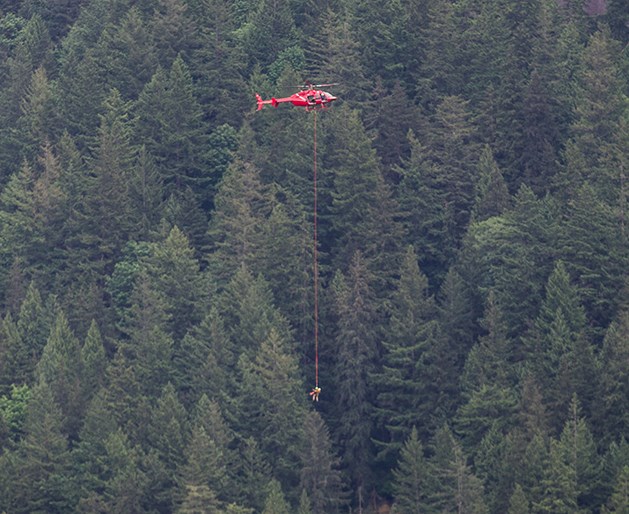Following five deployments from Thursday to Saturday, Squamish Search and Rescue is asking the public to keep their recreation objectives conservative, as COVID-19 pandemic protocols are still in place.
These weekend operations required a lot of resources. A helicopter was called to help on three occasions. A couple of the calls required a team of two dozen rescuers.
In total, rescue manager BJ Chute estimated those operations required about 500 volunteer hours.
“The fact that we had a relatively quick uptick in calls over a short period of time — you know, the system can handle that, but I still think it’s in everybody’s best interest, and we’re still asking people to recreate in more of a moderate pace than they may normally do,” said Chute.
“SAR in the province is still a volunteer system, so the response is relying on people volunteering their time and being available to volunteer their time. But also we are still operating under our pandemic protocol. And we haven’t had an instance where it has caused a delay, but, certainly, I know from being a paramedic, our emergency calls just take longer.”
People are screened for COVID-19 symptoms more thoroughly, and crew sizes in vehicles and helicopters sometimes have to be limited. Protective gear may also be required, and that adds more time as well.
All of this could have an impact on how long it takes for crews to arrive.
It’s important for people to pack gear and supplies that they may need if they get lost or injured, Chute said.
On Thursday, rescuers responded to three incidents, said Chute.
That day, a vehicle skidded off the Squamish Valley Forest Service Road into the Squamish River. Crews were called in, but didn’t have to make a rescue, as the driver managed to pull himself to safety.
Later, around 5 p.m., a group that included two adults and two children was lost while hiking Al’s Habrich Trail, which starts at the peak of the Sea to Sky Gondola. Search and rescue responded with a ground and air team, but, ultimately, staff from the gondola were able to find the group and lead them back.
That night, around 8:30 p.m. a swift water rescue was required for two people stranded on a sandbar in the Cheakamus River in Paradise Valley.
“They actually hiked up the bar without crossing the river, and then they tried to make their way back across the river and the water was too high, so they were stuck,” Chute said.
On Friday, a climber wedged her knee on a route on the Apron of the Stawamus Chief and became stuck. A helicopter long-lined a team in and they freed her after using dish soap to slide her knee out of a crack.
On Saturday, crews rescued a mountain biker who hit a tree at the Hot Tuna trail around Alice Lake. The rider, in his 50s, was seriously hurt and rushed to Squamish Airport, where paramedics airlifted him to a hospital in the Vancouver area.
Chute said at least three of the five cases involved locals.
The gondola hikers were from out of town, but it was unclear where the driver who fell into the river was from, he said.
All the other rescues involved people from town, Chute said.
These cases were not the only ones where rescuers were called to help recently.
For example, RCMP called search and rescue on May 24 after a man fell into Raffuse Creek around Mamquam River, approximately 24 kilometres up the Mamquam River FSR. He drifted 14 kilometres from his original location before campers pulled him from the river.
Paramedics were also there to help out.
In the meantime, conservation officers, who have been helping enforce COVID-19 park and recreation site closures said that this past weekend they were dealing mainly with wildlife conflicts.
For now, it’s unclear if this spate of incidents are a change from other years, Chute said. The May long weekend has historically marked the beginning of the rescue season.
Earlier this year, rescuers reported that there was a decrease in calls as a result of the pandemic lockdown.
The uptick in incidents arrived a little over two weeks after the province partially opened up several popular provincial parks in the Sea to Sky Corridor, such as Alice Lake and the climbing areas of the Stawamus Chief.
The Sea to Sky Gondola also recently opened up to the public.
To avoid overtaxing the healthcare system, authorities have been asking people to refrain from partaking in risky activities.
During her press briefing on June 1, provincial health officer Dr. Bonnie Henry told The Chief there were concerns in March and April that injured recreationalists could cause a strain on the healthcare system that could’ve been overburdened by COVID-19 patients.
She echoed Chute’s concerns that rescue efforts in these times are a different ballgame.
“The fact that this virus is still out there means that search and rescue missions are all that more complicated,” said Henry.
Previously, the province had not explicitly said which activities it had deemed too risky to undertake.
However, on June 1, when asked whether summer activities like mountain biking, climbing, hiking and kiteboarding were acceptable at this point, Henry appeared to give the green light — but with some words of caution.
“We all need to balance that, but on the other hand, these are activities that people are missing, that they mostly do safely, and, now that our parks are opening, they are ones that we can do safely in that you don’t have a lot of physical contact with other people,” she said.
“Our message is to be careful, to make sure that you have someone with you who can assist you, to not take those extra risks, and to try and do things as safely as you possibly can.”




